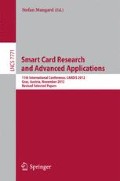Abstract
We propose a practice-oriented scheme for protecting RAM access pattern. We first consider an instance which relies on the use of a secure (trusted) hardware buffer; it achieves both security and performance levels acceptable in practice by adapting ideas from oblivious RAM mechanisms, yet without the expensive (re-)shuffling of buffers. Another instance requires no special hardware, but as a result leads to a higher, yet practical overhead. One of the main features of the proposal is to maintain the history of memory access to help hiding the access pattern. We claim that under reasonable assumptions, the first scheme with trusted memory is secure with overhead of only 6 ×, as is the second scheme with overhead of (2m + 2ℓ h + 2) × where m and ℓ h are respectively the size of the buffer and history. We note that although the proposal is particularly focused on the software execution protection environment, its security may well be appropriate for most uses in the remote storage environment, to prevent access pattern leakage of cloud storage with much lower performance overhead than existing solutions.
Access this chapter
Tax calculation will be finalised at checkout
Purchases are for personal use only
Preview
Unable to display preview. Download preview PDF.
References
Ajtai, M.: Oblivious RAMs without cryptographic assumptions. In: Schulman, L.J. (ed.) STOC, pp. 181–190. ACM (2010)
Boneh, D., Mazieres, D., Popa, R.A.: Remote Oblivious Storage: Making Oblivious RAM Practical. Technical Report MIT-CSAIL-TR-2011-018, Massachusetts Institute of Technology (2011)
Chor, B., Goldreich, O., Kushilevitz, E., Sudan, M.: Private Information Retrieval. In: FOCS, pp. 41–50. IEEE Computer Society (1995)
Damgård, I., Meldgaard, S., Nielsen, J.B.: Perfectly Secure Oblivious RAM without Random Oracles. In: Ishai, Y. (ed.) TCC 2011. LNCS, vol. 6597, pp. 144–163. Springer, Heidelberg (2011)
Goldreich, O.: Towards a Theory of Software Protection and Simulation by Oblivious RAMs. In: Aho, A.V. (ed.) STOC, pp. 182–194. ACM (1987)
Goldreich, O., Ostrovsky, R.: Software Protection and Simulation on Oblivious RAMs. J. ACM 43(3), 431–473 (1996)
Goodrich, M.T.: Data-Oblivious External-Memory Algorithms for the Compaction, Selection, and Sorting of Outsourced Data. In: Rajaraman, R., Meyer auf der Heide, F. (eds.) SPAA, pp. 379–388. ACM (2011)
Goodrich, M.T., Mitzenmacher, M.: Privacy-Preserving Access of Outsourced Data via Oblivious RAM Simulation. In: Aceto, L., Henzinger, M., Sgall, J. (eds.) ICALP 2011, Part II. LNCS, vol. 6756, pp. 576–587. Springer, Heidelberg (2011)
Goodrich, M.T., Mitzenmacher, M., Ohrimenko, O., Tamassia, R.: Oblivious RAM simulation with Efficient Worst-Case Access Overhead. In: Cachin, C., Ristenpart, T. (eds.) CCSW, pp. 95–100. ACM (2011)
Goodrich, M.T., Mitzenmacher, M., Ohrimenko, O., Tamassia, R.: Practical Oblivious Storage. In: Bertino, E., Sandhu, R.S. (eds.) CODASPY, pp. 13–24. ACM (2012)
Goodrich, M.T., Mitzenmacher, M., Ohrimenko, O., Tamassia, R.: Privacy-Preserving Group Data Access via Stateless Oblivious RAM Simulation. In: Rabani, Y. (ed.) SODA, pp. 157–167. SIAM (2012)
Kushilevitz, E., Lu, S., Ostrovsky, R.: On the (In)security of Hash-based Oblivious RAM and a New Balancing Scheme. In: Randall, D. (ed.) SODA, pp. 143–156. SIAM (2012)
Lorch, J.R., Mickens, J.W., Parno, B., Raykova, M., Schiffman, J.: Toward Practical Private Access to Data Centers via Parallel ORAM. IACR Cryptology ePrint Archive, 2012:133 (2012)
Lu, S., Ostrovsky, R.: Distributed Oblivious RAM for Secure Two-Party Computation. IACR Cryptology ePrint Archive, 2011:384 (2011)
Osvik, D.A., Shamir, A., Tromer, E.: Cache Attacks and Countermeasures: The Case of AES. In: Pointcheval, D. (ed.) CT-RSA 2006. LNCS, vol. 3860, pp. 1–20. Springer, Heidelberg (2006)
Pinkas, B., Reinman, T.: Oblivious RAM Revisited. In: Rabin, T. (ed.) CRYPTO 2010. LNCS, vol. 6223, pp. 502–519. Springer, Heidelberg (2010)
Shi, E., Chan, T.-H.H., Stefanov, E., Li, M.: Oblivious RAM with O((logN)3) Worst-Case Cost. In: Lee, D.H., Wang, X. (eds.) ASIACRYPT 2011. LNCS, vol. 7073, pp. 197–214. Springer, Heidelberg (2011)
Stefanov, E., Shi, E., Song, D.: Towards Practical Oblivious RAM. CoRR, abs/1106.3652 (2011)
Williams, P., Sion, R.: Usable PIR. In: NDSS. The Internet Society (2008)
Williams, P., Sion, R.: SR-ORAM: Single Round-trip Oblivious RAM. In: ACNS, Industrial Track, pp. 19–33 (2012)
Zhuang, X., Zhang, T., Lee, H.-H.S., Pande, S.: Hardware Assisted Control Flow Obfuscation for Embedded Processors. In: Irwin, M.J., Zhao, W., Lavagno, L., Mahlke, S.A. (eds.) CASES, pp. 292–302. ACM (2004)
Author information
Authors and Affiliations
Editor information
Editors and Affiliations
Rights and permissions
Copyright information
© 2013 Springer-Verlag Berlin Heidelberg
About this paper
Cite this paper
Nakano, Y., Cid, C., Kiyomoto, S., Miyake, Y. (2013). Memory Access Pattern Protection for Resource-Constrained Devices. In: Mangard, S. (eds) Smart Card Research and Advanced Applications. CARDIS 2012. Lecture Notes in Computer Science, vol 7771. Springer, Berlin, Heidelberg. https://doi.org/10.1007/978-3-642-37288-9_13
Download citation
DOI: https://doi.org/10.1007/978-3-642-37288-9_13
Publisher Name: Springer, Berlin, Heidelberg
Print ISBN: 978-3-642-37287-2
Online ISBN: 978-3-642-37288-9
eBook Packages: Computer ScienceComputer Science (R0)

